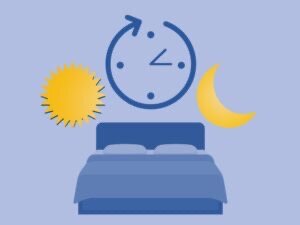Time cues and anchors to our day have never been so important. In a period of unrest and change, such as with Covid-19 and the disruption it has brought to our lives, having regular synchronicity to our day is important not only for our physical, but also our mental wellbeing.
Why? The answer lies deep in the brain and our relationship with night and day.
Inherent to all humans is a natural, intrinsic rhythm. A circadian rhythm. Essentially it is a recurring cycle over 24 hours which governs our body’s need to maintain balance (homeostasis). It regulates all our biological and physiological processes and helps our bodies respond and adapt to any environmental changes. Everyone has a circadian rhythm which changes throughout our lifespan; from babies to teenagers, generally settling in adulthood and altering again as we age.
Throughout day and night our circadian rhythm drives several body processes such as digestive activity, body temperature, physical activity, alertness, hormone levels, immune function and perhaps most critically, sleep. It is the sleep rhythm that is so important to consider as it it significantly impacts on all areas of our physical and mental health.
We are all generally entrained to a 24 hour circadian rhythm, of which our sleep/wake rhythm is inextricably linked to the light/dark cycle. How we interact with light and dark involves a complex interaction of photic (light) information which passes through the retina, deep into the brain, to the hypothalamus which houses the governor of our circadian rhythms, the Suprachiasmic Nucleus (SCN). If this becomes damaged in any way our circadian rhythm becomes offset and body balance (homeostasis) is disrupted. The level of which depends on how desynchronised our light/dark cycle has become.
In terms of sleep, under normal circumstances, the circadian rhythm will naturally rise in the early morning as depicted by the dark blue line in the below illustration, promoting wakefulness and alertness, and will reach a peak in the evening. After a waking period of approximately 14-16 hours the pressure to sleep increases and we become tired. With the onset of darkness, the circadian rhythm drops to the lowest level, a hormone called Melatonin is released, and sleep ensues (The Sleep Council 2020). This is why regularity breeds sleep and our daily routines are so important for promoting good sleep habits. In normally entrained individuals, your circadian rhythm interacts with this homeostatic sleep drive in an opposing manner to provide consolidated wakefulness during the daytime hours and continuous sleep during the night. When this doesn’t occur sleep problems can exist and you should seek advice from your GP regarding persistent disruptions to your sleep/wake cycle.
Typically our regular rhythm of sleep and wake fall into our daily routine of life events (work, school etc.). Through our daily routine we have natural time cues or ‘anchors’ that help us maintain the body’s balance in terms of where it’s at at any given point in the day i.e. hungry, tired, seeking light etc. However, circadian rhythms can become disrupted through a number of ways, either external factors (e.g. shift work, travel, lifestyle, health condition) or a sleep disorder. When daily life gets interrupted, such as is the case during the Covid-19 pandemic, our daily anchors become offset and it is easy to lose the routine, with sleep patterns often paying the price.
The good news is ensuring you maintain a healthy daily rhythm, in the absence of our normal time cues, can be achieved following some simple steps - outlined below. Try some of these if you're experiencing difficulty with sleep or maintaining a daily routine during this most bizarre of times.
Sleep strategy
Develop a ‘strategy to sleep’ and ensure you’re getting the recommended 7-9 hours sleep
Ensure you have a sleep routine with a regular bed time and get up time.
Regular bed and wake times help sleep onset & ensure sleep is maintained throughout the night. Set a wake-up time and work backwards in 90 min cycles to get the right bed-time.
Avoid regular excessively late nights or long lie ins
Only go to your room when you’re ready to sleep.
Be realistic if making changes e.g. try 3/7 nights at first
Protect your sleep time.
Environment & Behaviours
Seek natural sunlight as much as possible during the day
Eat at normal meal times with a small snack in between if needed
Avoid large meals before bed
Ensure you have a sleep environment to help good sleep (calm, low light, no noise, comfortable, ambient temperature)
Avoid devices in bed/bedroom - minimise exposure to blue light
Avoid stressful news/situations before sleep time
Try some gentle interventions to help poor sleep e.g. cognitive behavioural therapy (CBT - see your GP for advice)
Engage in some physical activity regularly (preferably outside if possible)
Avoid screen time before bed
Limit caffeine & alcohol intake (avoid excessive caffeine, alcohol especially before bed)
Use sleep medication as a last port of call. See GP. Only take sleep medication once you’ve exhausted all other practical strategies to improve your sleep.
Recognise everyone has an individual need. What works for one person might not work for you.
Change one aspect of your sleep strategy at a time, then you know what works for you.



